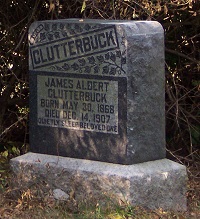Town Marshal James Albert Clutterbuck | Florence, Kentucky
 Age: 40
Age: 40
Served: 1 year
1906 to December 15, 1907
BACKGROUND
Town Marshal John Meeks was dismissed from his position by the town council sometime about December 1906. Albert Clutterbuck, a farmer and nephew of a well-known law enforcement officer, was hired to replace him. Marshal Clutterbuck’s uncle, James R. Clutterbuck, served as a Constable in 1866, Boone County Deputy Sheriff in 1881, and Boone County Sheriff from 1884 to 1888.
Meeks resented Marshal Clutterbuck and blamed him for his dismissal.
INCIDENT
On December 14, 1907, their paths crossed on Main Street and Meeks taunted Marshal Clutterbuck, demanding to know why he had him removed. Marshal Clutterbuck denied the accusation. Meeks called him a liar. Marshal Clutterbuck stepped away saying, “John, you know that is hard to take.” With that, Meeks drew a .38 caliber Smith & Wesson revolver and fired three times at Marshal Clutterbuck. The first two missed, but as Marshal Clutterbuck was turning away, the third one struck him at the navel, ranging left and lacerating his intestines. The distance between them was so short that there were powder burns on Marshal Clutterbuck’s shirt.
Marshal Clutterbuck was taken to the home of Michael Cahill.
Town Marshal Springer Carpenter arrested Meeks and removed him to the Boone County Jail. In his statement to Boone County Deputy Sheriff Hume, Meeks claimed self-defense.
DEATH
Marshal Clutterbuck died the following day, December 15, 1907. His body was taken to and laid out in his mother’s home on Price Pike. Marshal Clutterbuck was survived by his mother, Frances, and eleven siblings. He was buried December 18, 1907, in the Clutterbuck Family Cemetery at the end of Price Pike, on the left, about 200 feet from the road.
JUSTICE
After Marshal Clutterbuck’s death, he was removed to the Kenton County Jail in Covington, Kentucky, as a mob arrived at the Boone County jail to lynch him. During April 1908, on the date Meeks’s trial was scheduled, defense attorney A. M. Caldwell requested a change of venue, which Judge Cammack denied. He then requested a continuance, which the judge also denied. Then, the lawyer spent days going through and finding reasons to dismiss 75 prospective jurors. Finally, Meeks was tried in a trial that lasted a day and a half. He was convicted on April 24, 1908 and sentenced to life in the Kentucky penitentiary as recommended by the jury. Immediately, following the verdict, Attorney Caldwell requested a new trial and Judge Cammack denied the request. He then order Meeks immediately transported to the state penitentiary in Frankfort.
Eight years later, during an altercation between another prisoner and prison guard P. J. Mulken, Meeks intervened and saved Mulken’s life. On July 6, 1916, Meeks was paroled after having served only eight years.
If you know of any information, artifacts, archives, or images regarding this officer or incident, please contact the Greater Cincinnati Police Museum at Memorial@Police-Museum.org.
© This narrative created on December 3, 2012 by Cincinnati Police Lieutenant Stephen R. Kramer (Retired), Greater Cincinnati Police Historical Society President. All rights are reserved to him and the Greater Cincinnati Police Museum